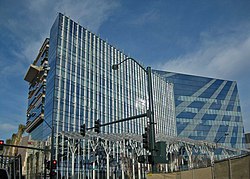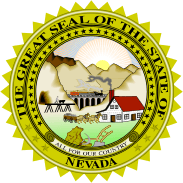Government of Nevada
The government of Nevada comprises three branches of government: the executive branch consisting of the Governor of Nevada and the Governor's cabinet along with the other elected constitutional officers; the legislative branch consisting of the Nevada Legislature which includes the Assembly and the Senate; and the judicial branch consisting of the Supreme Court of Nevada and lower courts.
Executive
The Governor of Nevada and the Governor's cabinet, along with the other elected constitutional officers, constitute the executive branch.
Governor
The Governor of Nevada is the chief magistrate of Nevada,[1] the head of the executive department of the state's government,[1] and the commander-in-chief of the state's military forces.[2] The governor has a duty to enforce state laws,[3] and the power to either approve or veto bills passed by the Nevada Legislature,[4] to convene the legislature at any time,[5] and, except in cases of treason or impeachment, to grant pardons and reprieves.[6]
The governor has a four-year term.[7] To be elected governor, a person must be at least 25 years old, and must have been a citizen of Nevada for at least two years, at the time of election.[8] The Lieutenant Governor of Nevada is not elected on the same ticket as the governor.
The current Governor is Democrat Steve Sisolak.
Cabinet
The Governor's cabinet is composed of the heads of the several state agencies of Nevada:
- Lieutenant Governor
- Director of the Department of Administration
- Director of the Department of Agriculture
- Director of the Department of Business and Industry (B&I)
- Director of the Department of Conservation & Natural Resources
- Director of the Department of Corrections
- Director of the Department of Tourism and Cultural Affairs
- Executive Director of the Office of Economic Development
- Superintendent of Public Instruction of the Department of Education
- Director of the Department of Employment, Training & Rehabilitation (DETR)
- Director of the Nevada State Office of Energy
- Director of the Department of Health and Human Services (DHHS)
- Director of the Nevada Indian Commission
- Chief Information Officer of the Division of Enterprise Information Technology Services (EITS)
- Director of the Department of Motor Vehicles (DMV)
- Adjutant General of the Nevada Military Department and Nevada National Guard
- Director of the Department of Personnel (DOP)
- Director of the Department of Public Safety (DPS)
- Chancellor of the Nevada System of Higher Education
- Director of the Department of Transportation (NDOT)
- Executive Director of the Department of Veterans Services
- Director of the Nevada Department of Wildlife
State agencies
Major state agencies and elected offices include:
- Nevada Attorney General and the Department of Justice
- Nevada State Treasurer
- Nevada Secretary of State
- Nevada Gaming Control Board
- Consumer Health Assistance
- Nevada State Controller
- Nevada Department of Cultural Affairs
- Governor's Office of Economic Development
- Nevada Film Office
- Department of Employment, Training & Rehabilitation
- Department of Health and Human Services
- Division of Minerals, Commission on Mineral Resources
- Department of Personnel
- Advisory Council for Prosecuting Attorneys
- Public Employees Benefit Program
- Public Employees Retirement System
- Public Utilities Commission[9]
- Department of Taxation
- Commission on Tourism
- Universities and Community Colleges of Nevada
- Western Interstate Commission for Higher Education
Legislature
The Nevada Legislature is a bicameral body divided into an Assembly and Senate. Members of the Assembly serve for 2 years, and members of the Senate serve for 4 years. Senators and Assemblymen/women are limited to a maximum of 12 years service in each house (by appointment or election which is a lifetime limit)—a provision of the constitution which was upheld by the Supreme Court of Nevada in a unanimous decision. Each session of the Legislature meets for a constitutionally mandated 120 days in every odd-numbered year, or longer if the Governor calls a special session.
Currently, the Assembly is controlled by the Democratic Party (27 to 15 majority) and the Senate is also controlled by the Democratic Party (11 to 10 majority).
On December 18, 2018, Nevada was the first State with a female majority in its legislature. Nine of the 21 seats in the Nevada Senate are currently held by women, along with 23 of the 42 seats in the Assembly.[10]
Judiciary
The Supreme Court of Nevada is the state supreme court. Original jurisdiction is divided between the District Courts (with general jurisdiction), and Justice Courts and Municipal Courts (both of limited jurisdiction).
Local government
Incorporated towns in Nevada, known as cities, are given the authority to legislate anything not prohibited by law. A recent movement has begun to permit home rule in incorporated Nevada cities to give them more flexibility and fewer restrictions from the Legislature.
Unincorporated towns are settlements eminently governed by the county in which they are located, but who, by local referendum or by the act of the county commission, can form limited local governments in the form of a Town Advisory Board (TAB)/ Citizens Advisory Council (CAC), or a Town Board.
Town Advisory Boards and Citizens Advisory Councils are formed purely by act of the county commission. Consisting of three to five members, these elected boards form a purely advisory role, and in no way diminish the responsibilities of the county commission that creates them. Members of advisory councils and boards are elected to two-year terms, and serve without compensation. The councils and boards, themselves, are provided no revenue, and oversee no budget.
Town Boards are limited local governments created by either the local county commission, or by referendum. The board consists of five members elected to four-year terms. Half the board is required to be up for election in each election. The board elects from within its ranks a town chairperson and town clerk. While more powerful than Town Advisory Boards and Citizens Advisory Councils, they also serve a largely advisory role, with their funding provided by their local county commission. The local county commission has the power to put before residents of the town a vote on whether to keep or dissolve a town board at any general election. Town boards have the ability to appoint a town manager if they choose to do so.
See also
References
- NV Const. art. V, § 1.
- NV Const. art. V, § 5.
- NV Const. art. V, § 7.
- NV Const. art. IV, § 35.
- NV Const. art. V, § 9.
- NV Const. art. V, § 13.
- NV Const. art. V, § 2.
- NV Const. art. V, § 3.
- http://puc.state.nv.us Archived 2007-10-24 at the Wayback Machine
- Price, Michelle L. (2018-12-18). "Click to copyhttps://apnews.com/8bebc3041f564d449365feff713bf7a4". Associated Press. Retrieved 2018-12-20. External link in
|title=(help)

